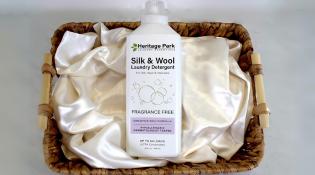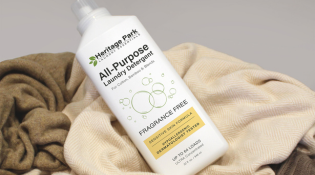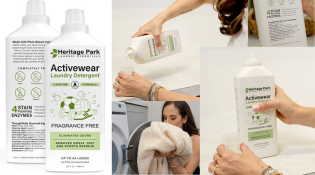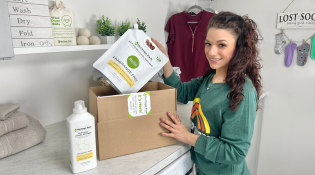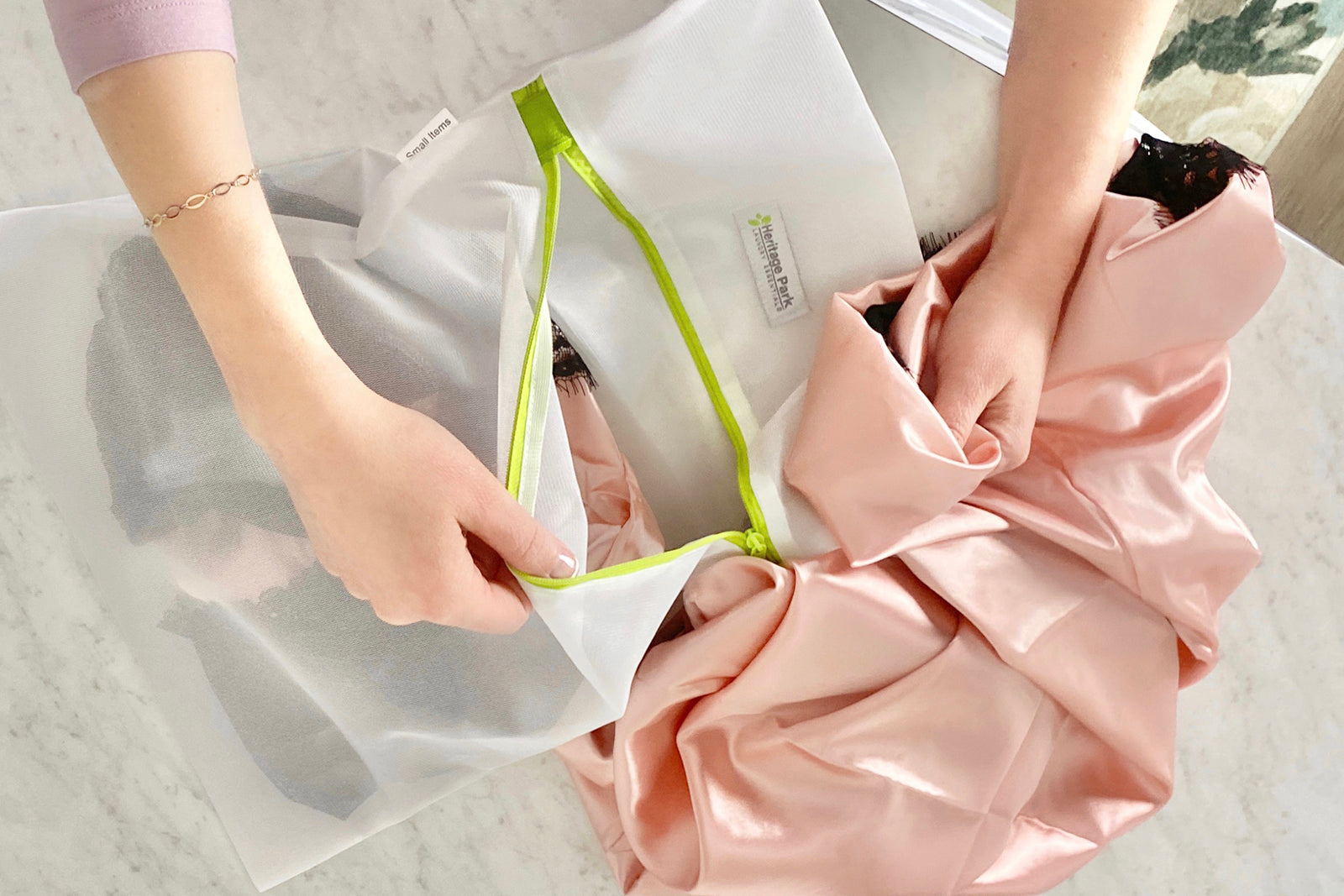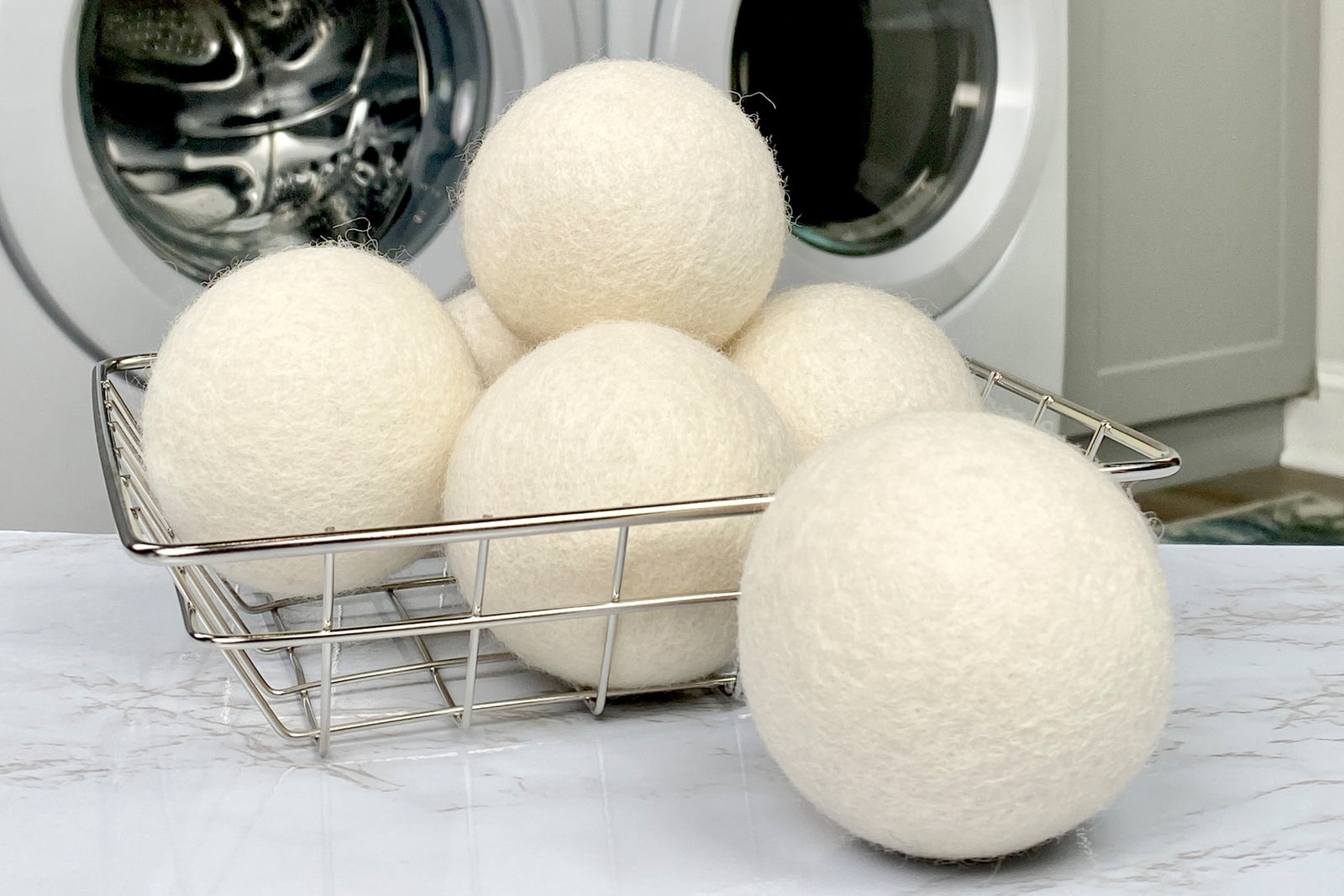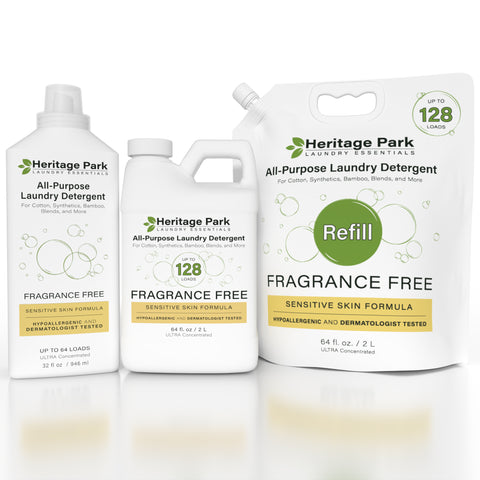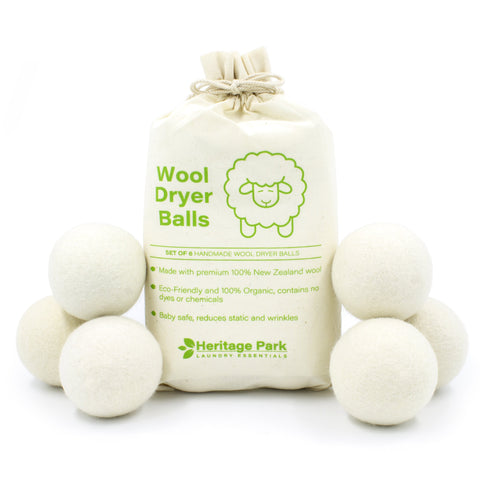Build-up on bath towels is a common problem that affects the look, feel, and performance of your towels. This article shows you how to remove bath-towel build-up as well as how to prevent it from happening in the first place. Follow this advice for fluffy, soft, absorbent towels.
Table of Contents
- Keep Build-Up From Ruining Your Bath Towels
- Removing and Preventing Build-Up on Towels
- Everyday Causes of Towel Build Up and How to Fix Them
- Too much detergent
- Using fabric softener
- Using dryer sheets
- Hard water
- Mold and mildew build-up
- Dirty washing machine
- Towel Care 101: Keep Towels Soft From the Start
- Unboxing and First Wash of Your New Towels
- How to Sort Your Towels Before Washing
- How to Choose a Laundry Detergent
- Simple Tips for Washing and Drying Towels
- Avoiding Harmful Chemicals
- Wool Dryer Balls: A Towel's BFF
- Storing Towels and Caring for Minor Snags and Pulls
- Reviving and Restoring Towels in Three Simple Steps
- Welcome to the World of Heritage Park Laundry Essentials
Keep Build-Up From Ruining Your Bath Towels
Nothing ruins a good bath towel like build-up. Over time, your favorite towel goes from soft, fluffy, and absorbent to matted, scratchy, and uncomfortable. Even high-quality luxury bath towels accumulate build-up, which diminishes their look, feel, and absorbency. Common culprits that lead to build-up include hard water, dryer sheets, your choice of detergent, and even your washing machine.
Removing and Preventing Build-Up on Towels
The good news is, bath towel build-up is a problem that can be solved, and sometimes even avoided altogether. The towel gurus at Fine Linen and Bath and the laundry pros at Heritage Park Laundry Essentials are here to help you identify common causes of build up; set up a laundry and care routine that keeps towel build-up at bay; and offer simple steps for reviving and refreshing your towels with common household items including vinegar and baking soda.

Everyday Causes of Towel Build Up and How to Fix Them
Most of us probably don’t think too much about our laundry routines. But when it comes to bath towels, there are lots of things we do on a regular basis that promote build-up:
Too much detergent
- The cause: Using too much detergent, especially in front-loading machines which use less water and [NS1] are likely to leave a residue behind.
- The fix: Use about half the recommended amount of detergent. We suggest choosing a detergent specially formulated for high-end bath towels, such as Heritage Park Laundry Essentials.
Using fabric softener
- The cause: Using liquid fabric softener, which is oil- and petroleum-based and leaves a slick coating on towel fibers.
- The fix: Skip the softener. If you absolutely can’t give up the scent, use a tiny amount every other wash at most.
Using dryer sheets
- The cause: Using dryer sheets. Similar to fabric softeners, these leave behind a coating on the fabric[NS2].
- The fix: Invest in some wool dryer balls to reduce dry timeand keep your towels fluffy and soft.
Hard water
- The cause: Hard water, which is high in minerals that make it hard for detergent to dissolve, leaving you with dirty towels and a gummy build-up. The calcium and magnesium in hard water also cause scale to build up and damage pipes and appliances.
- The fix: First, realize you’re not alone; nearly 85 percent[NS3] of the country lives in an area where hard water is a problem. Installing a whole-house water softener is expensive. If hard water is an issue causing buildup, see below for our instructions on “refreshing and reviving” towels below with a time-tested method using white vinegar and baking soda.
Mold and mildew build-up
- The cause: Letting mold and mildew build up on towels by over stuffing the dryer (towels don’t fully dry ) or leaving wet towels in a pile.
- The fix: Don’t over stuff your dryer! Shake towels before putting them in and even mid-cycle. If you’re not going to wash a wet towel immediately, hang it to dry.
Dirty washing machine
- The cause: A dirty washing machine. Yes, the very appliance you count on to clean can be making towels worse by leaving build-up including dirt, detergent, and hard-water residue on them.
- The fix: Clean your machine every few months with a simple procedure like this one or use a washing machine cleaner. Always follow manufacturer's directions.
Changing these habits will go a long way toward battling stiff, scratchy, smelly towels that lose their absorbency due to build-up. But there’s more you can do to get the most out of your towels.
Towel Care 101: Keep Towels Soft From the Start
Along with breaking laundry habits that lead to build-up, taking proper care of your towels from the start will keep them soft, fresh, and absorbent. Think of this as Towel Care 101, a list of essential laundering tips that will keep your towels looking great and performing well over time, including:
- Sorting by color and weight
- Choosing the proper detergent
- Washing and drying gently
- Avoiding harsh detergents and chemicals
- Minimizing mildew and snags
- Restoring towels that have lost absorbency and freshness
Unboxing and First Wash of Your New Towels
If you are unboxing new towels, always read and follow the instructions on the label. Click here for a guide to understanding laundry care labels. You'll want to launder your towels prior to using them. Carefully remove any plastic tags using sharp scissors prior to laundering to avoid snags. Do not pull tags to remove as this can cause them to catch on fibers and damage the fabric.
How to Sort Your Towels Before Washing
Sort your towels by color into three general categories: white, light, and dark. This will prolong their life and avoid color bleeding in the wash. You may also want to sort towels according to weight. Fine towels come in varying weights and are measured by GSM, which translates to “grams per square meter." Expressed as a number, GSM is directly aligned with a towel’s plushness, quality, feel, and performance. You can learn more about GSM in towels here.
Cotton bath towels typically range between 300 and 900 GSM, with the higher GSM feeling heavier and more absorbent. A towel in the 400 to 600 GSM range is considered mid-weight, but still of high quality. These towels offer consistent, reliable performance and a wonderful feel; they are soft and absorbent without being too heavy. This means they can air dry relatively quickly, and can easily be washed and dried in a regular load. A towel of 700 GSM and above is considered heavyweight. These towels are hefty, highly absorbent, and rich in depth and feel. Because of their weight, towels with high GSM take longer to hang dry and should be washed in a smaller load by themselves.
Also, sorting by type of terry can be useful. Some styles of terry are long-loop, zero-twist, velour, and micro-cotton or microfiber. Certain velour and zero-twist terry designs can give off more lint in the first few washings, so it’s important to take this into consideration to not wash and dry these with any other items, especially clothing.
How to Choose a Laundry Detergent
Harsh, chemical-filled grocery store brand detergents can be full of ingredients that can damage fibers over time. These ingredients can also weaken fabric thread fibers, causing them to appear dull and lose absorbency. Choosing the proper laundry soap can dramatically extend the life and enhance the performance of your towels.
For cotton, linen, polyester, and cotton-blend towels, we recommend our original formula Heritage Park Luxury All-Purpose Detergent. This detergent is specially formulated and concentrated, so a little will go a long way. The pH-neutral blend contains powerful enzymes to clean and remove stains without damaging fabrics; plant-based acids that deter mold and mildew; and natural salts that soften water and remove mineral build-up.
Simple Tips for Washing and Drying Towels
Machine wash towels in cold water to help colors stay bright and extend the life of the fibers.
Don’t over stuff the washer or launder towels with other clothing items. Rough and abrasive objects – buttons, zippers, embellishments, etc. – can pull at the towel’s pile and lead to fraying and other damage. Bath rugs can also wear down towels, so wash them separately. Give towels a gentle shake when removing them from the washing machine; this will fluff the fibers and speed up the drying process. Excessive heat will damage fibers and increase the shrinkage of the towels, so tumble dry on low heat only. Don’t over-dry towels. Never dry clean or iron your towels, as this will reduce absorbency.
Avoiding Harmful Chemicals
Many seemingly innocuous products – even those that claim to clean, brighten, or soften towels – can do serious damage. Never use any type of brightening detergent, which will affect the color of your towels; chlorine bleach, which will weaken towel fibers, fade colors, yellow white towels, and create a rough texture; or fabric softeners, which will leave a waxy coating on fibers that diminishes absorbency. Similarly, never use fabric softener sheets in the dryer, which can do the same thing. Also, don’t allow your towels to come in contact with bathroom cleansers and skincare products that may contain bleaching agents; these can cause permanent discoloration.
Heritage Park Luxury All-Purpose Detergent is made with plant-based, thoughtfully sourced ingredients that are safe for people, pets, and the planet; it is never tested on animals.

Wool Dryer Balls: A Towel's BFF
Using a set of wool dryer balls to dry your towels serves THREE important purposes:
1. Wool dryer balls soften towels without the use of any chemicals. As we mentioned earlier, fabric softener and dryer sheets are to be avoided at all times, but especially with towels. These products leave a waxy build-up on your towels and in your machine that flatten fibers and minimize absorbency.
2. Wool dryer balls agitate, separate, and soften the fibers in your towels during the drying cycle. This helps your towel feel
3. Wool dryer balls save drying time by continually separating your towels as they tumble and allowing air to circulate to maximize air flow. This helps prevent the towels from balling up during the drying cycle and can shorten the time it takes to dry your towels by up to 25 percent!
Not all wool dryer balls are created equal. Hand made in Nepal of 100% New Zealand Wool yarn, our dryer balls are natural, eco-friendly, sustainable, and reusable. No chemicals, synthetic fragrances, or dyes are used during the manufacturing and felting process. And they are safe for even the most sensitive skin. Use six dryer balls for a large load or three dryer balls for a medium load.
Storing Towels and Caring for Minor Snags and Pulls
Hang towels after using them rather than putting them in a hamper where they can grow mildew, or on the floor where they can not only grow mold/mildew on your towels, but can also damage your flooring. Fold and stack clean towels and store them in a dry linen cabinet. If your linens are stored in a bathroom closet, consider putting some type of moisture absorbers such as Damp Rid or Arm & Hammer Moisture and Odor Eliminator. The damp environment of the bathroom from shower steam can cause towels to become musty smelling. Remember to rotate the stack so all your towels wear evenly. Take care of stray pulled loops by cutting them to the level of surrounding loops with a pair of sharp scissors. On a quality made towel this won’t cause any harm and will help avoid further snagging and pulls down the line.

Reviving and Restoring Towels in Three Simple Steps
Even if you're taking all the proper steps, repeated laundering can lead to build up on even the finest towels. This is particularly true if you have hard water, or well water, which can leave behind mineral deposits as well as a coating of laundry soap that doesn’t rinse off. You can restore your cotton towels with three simple steps using just baking soda and white vinegar.
- Wash your towels in warm water or hot water -- not scalding -- with one cup of white distilled vinegar. This will strip towels of any built-up residue and help restore absorbency. DON'T USE DETERGENT, only white vinegar.
- Run the load a second time using only a half-cup of baking soda. This will help freshen and remove any lingering smells. AGAIN, DON'T USE DETERGENT, only baking soda.
- Dry according to instructions WITHOUT fabric softener sheets.
You can repeat this process when needed to keep your towels soft, fluffy, and smelling fresh.
Additionally, our team is here and ready to answer questions, offer recommendations, and help you learn to care for your towels.
Welcome to the World of Heritage Park Laundry Essentials
Here at Heritage Park, caring for fine fabric is our passion. As lifelong collectors of luxury sheets, towels, and table linens, we found that while many of the commercially available “gentle detergents” could still harm fabrics, or they didn’t get the job done, leaving tough stains such as lipstick, coffee, gravy, and salad oil stains. We believed we could do better and decided to fill that need. After more than a year of intensive research and product development, we created Heritage Park Laundry Essentials.
Our unique formulations have the perfect balance of powerful, yet safe, ingredients to remove tough, set-in stains while remaining gentle on clothing, bedding, towels, synthetic fabrics, and even heirloom linens. Heritage park contains NO sulfates, dyes, phosphates, chlorine, bleach, or caustics. It has a neutral pH and our All-Purpose Fragrance-Free wash has been dermatologist and pediatrician approved for those with sensitive skin or allergies. It is biodegradable and is Leaping Bunny Approved to be 100% cruelty-free and never tested on animals. Suitable for regular and HE machines, and proudly made in the United States. We also produce a line of laundry accessories including pure wool dryer balls, mesh wash bags, and more. We are delighted to have you as our customer and welcome you to contact us toll-free at 800-977-1841 or info@heritageparklaundry.com with any product feedback or questions.

